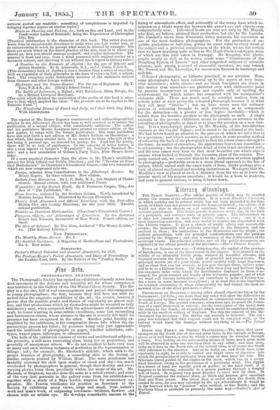Ittrrarq &traumas.
Tun PEKIN GAZETTE.—The official gazette of Pekin may be counted among the organs of the administration. It is a real Monitore Universel, in which nothing can be printed which has not been presented to the Em- peror, or which does not proceed from the Emperor himself; the editors of it would not dare to change or add anything, but under penalty of the severest punishment. This Pekin gazette is printed every day, in the form of a pamphlet, and contains sixty or seventy pages. The subscription to it does not amount to more than twelve francs a year ; and it is a most interesting collection, and very useful in making one acquainted with the Chinese empire. It gives a sketch of public affairs and remarkable events; the memorials and petitions presented to the Emperor, and his answers to them ; his instructions to the Mandarins and the people ; the judicial proceedings, with the principal condemnations and the pardons granted by the Emperor ; and also a summary of the deliberations of the sovereign courts. The principal articles, and all the public documents, are reprinted in the official gazettes of the provinces.—Hue's Chinese Empire.
TOWN OP TeRING-TOII FOIL—Tehing-tou-fou, the capital of the province of Ssetchouen, is one of the finest towns in the empire. it is situated in the middle of an admirably fertile plain, watered by beautiful streams, and bounded towards the horizon by hills of graceful and varied forms. The principal streets are of a good width, paved entirely with large flagstones, and so clean that you can scarcely, as you pass through them, believe your- self to be in a Chinese town. The shops with their long and brilliant signs, the exquisite order with which the merchandise displayed in them is ar- ranged, the great number and beauty of the tribunals, pagados, and of what we must call literary institutions,—all contribute to make of Tching-tou- fou a town in some measure exceptional ; or at least this is the impression we retained concerning it, when subsequently we had visited the most re- nowned cities of the other provinces.—/dem.
PROTECTION or DONXEYS.—Among other absurd objections taken by the Government, [of Elba,] one more than any other will show the difficulties to be surmounted by those who are embarked in commercial enterprises in the South of Europe. The present company, some time ago, proposed the forma- tion of a small tram-road or railway, for the conveyance of the metal from the mines to the beach ; an expedient which would be considered indispen- sable in the smallest colliery of England. For this the consent of the Go- vernment was necessary. The answer can scarcely be believed. The con - pony was informed that their request could not be complied with, as the railway would leave the donkeys without anything to do.—The Island Empire.
HINTS FOR FOREST OR DESERT TRAVELLING.—The moss that grow strongest on the North side of firs and other trees, in the latitude of Europe, gives, as is well known, a clue by which a course may be directed through a forest. For, looking on the surrounding masses of trees, much more moss will be observed in some one direction than in any other ; and that moss, lying as it does on the North side of the several trees, is of course due South with reference to the observer. And as he walks on, and fresh trees come constantly in sight, he is able to correct any slight error of direction into which the peculiarities of particular trees may at first have led him. The Siberians travel guided by the ripples in the snow, which run in a pretty fixed direction, owing to the prevalence of a particular wind. The ripples in a desert of sand are equally good as guides; or the wind itself, if it happens to be blowing, especially to a person pushing through a tangled belt of forest. It: requires very great practice to steer well by stars. In Tropical countries the zodiacal stars, as Orion and Antares, give excellent East and West points. The Great Bear is useful when the North Pole cannot be seen, for you may calculate by the eye whereabouts it would be in the heavens when its "pointers" were vertical, or due North ; and the Southern Cross is available in precisely the same way.—Galton's Art of Travel.






























 Previous page
Previous page